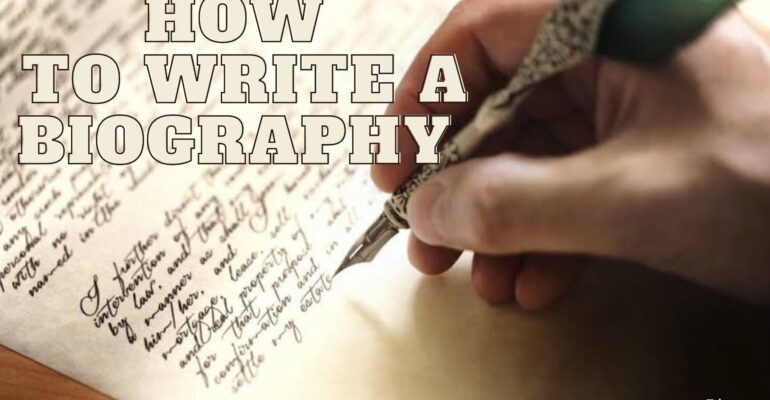Key Points to note before writing a Biography
November 10, 2022 2022-11-18 12:45Key Points to note before writing a Biography

What is a Biography:
We are bombarded with information from all sides in today’s world. It can be hard to choose between what is important and what isn’t. We usually end up struggling between good or bad, relevant or irrelevant, most important or less important, etc. Reading biographies is a great way to help you decide which information is important and which isn’t. But how? The biography of a person highlights their goals, experiences, experiments, works, failures, successes, good decisions, bad decisions, culture, and other significant events in their life. An accurate biography must depict the details of their life experiences and make it easy for others to relate to him.
Simply put, a biography is a written account of the series of events that make up a person’s life. Some of those events are going to be pretty boring, uninteresting, and bland so you’ll need to try to make your account as interesting as possible by adding more vital and visual details.
While there is a genre known as a fictional biography, for the most part, biographies are, by definition, nonfiction. It provides an account of the subject’s life from the earliest days of their childhood right up to the present day or their death, if the subject is deceased.
The job of a biography is more than just to outline the bare facts of a person’s life. Nobody is going to read bare facts. Rather than just listing the basic details of their upbringing, childhood challenges (if any), hobbies, education, work, relationships, and death, a well-written biography should also paint a picture of the subject’s personality, their experience of life as well as their challenges of life. It should clearly lay out what impact they have made and what forced you from inside to write their biography.
How to structure your Biography:
- Grabbing the reader’s attention is not easy. They may lose interest in the beginning if you don’t start with a solid hook to grab the reader’s attention.
- In most cases, biographies are written in chronological order unless you are a very audacious writer consciously trying to break from this trend.
- You should have a mind map of what to cover from a subject’s life that helps the reader to understand the subject. It should include areas like childhood, parents, siblings, upbringing, education, influences, accomplishments, relationships, etc., and then wrap your biography up with some details about the subject’s present activities if they are still alive. If they are deceased, make a mention of what impact they left behind.
Ask Questions Before you start
In what circumstances did they grow up? What did their parents do for a living? Did they have siblings? What did their childhood home and hometown look like? What were their favorite toys and friends as kids? Why do they think those things were important to them later on in life? Not only this, a good biography delves into what is really interesting about a person’s life—noteworthy achievements, moments of adversity, emotional setbacks, and major turning points. The best biography can encapsulate a subject’s entire life in an engaging way and provide enough personal details to give the reader an intimate look at their character. So, for writing a good biography you need to follow these steps:
In this blog, we will cover subject selection, permission and the research required to write a good biography
Choose your Subject by Researching really Hard:
Choosing a subject for your biography should be based on these points:
- To produce a biography is not one day job it requires sustained writing. That’s why you must choose your subject well and of your interest, because you have to maintain your interest throughout the research and writing process.
- You must consider whether the subject merits the reader’s interest. Producing a biography demands sustained writing from the author, and demands sustained reading from the reader.
Therefore, students should ask themselves if their chosen subject has had a life worthy of the reader’s interest.
Is there enough information available about the subject? If not, it means no fuel available to run the engine of your writing so drop the idea of writing a biography on a particular subject.
Ask permission from the subject to write the biography:
Before you dive into your research, make sure you get permission from the subject to write their biography. Ask them if they are willing to be the subject. Getting their permission will make writing the biography much easier and ensure that they have no issues and are open with information about their life. If you decide to write and publish the biography without the subject’s permission, legal action may be taken against you by the subject.
Research and interview with the Subject and with their close ones:
Research on the primary sources available on the subject includes books, letters, pictures, newspapers and newspaper clippings, magazines, internet articles, journals, videos, and interviews. Look for these sources at your local library or online and highlight any key information you come across in your sources.
Interviewing people who are close to the subject can add life to your research work. They can tell you stories and life incidents about the subject that you can’t find in any journals or books. You can record those interviews and can replay them many times when required.
We will cover the rest of the topics in our next blog on the same topic.

